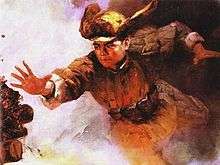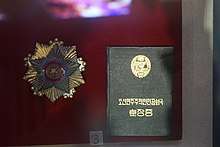Huang Jiguang
Huang Jiguang (Chinese: 黄继光; pinyin: Huáng Jìguāng; January 18, 1931 – October 19, 1952)[1] was a highly decorated Chinese soldier during the Korean War.
Huang Jiguang | |
|---|---|
 | |
| Native name | 黄继光 |
| Born | January 18, 1931 Huang Jiguang Village, Zhongjiang County, Sichuan, China |
| Died | October 19, 1952 (aged 21) Chorwon County, North Korea |
| Battles/wars | Korean War † |
| Awards | Order of the National Flag (First-Class) |
Biography
Huang was born in Sichuan Province, his mother is Deng Fangzhi and brother is Huang Jisheng. In March 1951, Huang decided to join the Chinese People's Volunteer Army to fight against the American-led United Nations forces in the Korean War.
After joining the war, Huang became a runner and was later awarded the Meritorious Service, Third Class for his bravery. At the Battle of Triangle Hill in October 1952, Huang's unit was tasked with destroying an enemy blockhouse. According to official accounts, Huang hurled himself against a machine gun slit on the blockhouse after running out of ammunition, blocking enemy fire while sacrificing his life. As a result of his heroism, the Chinese forces overran the position while annihilating a significant number of enemy soldiers. In one version of the story, it was also claimed that Huang's final action was specifically inspired by the Soviet war film Private Aleksandr Matrosov, which was in turn based on the real life exploit of Alexander Matrosov during the Great Patriotic War.[2]
Awards

Huang was posthumously given the title of "Combat Hero, Second Class",[2] which was later upgraded to "Combat Hero, Special Class". The North Korean government also awarded Huang with the title of "Hero of the Democratic People's Republic of Korea", a Gold Star Medal and the Order of the National Flag (First-Class).[3]
Legacy
A company of People's Liberation Army Air Force Airborne Corps is named after Huang Jiguang.[4]
See also
References
- PLA honored models: Huang Jiguang
- "马特洛索夫式的英雄黄继光" [Matrosov Style Hero, Huang Jiguang]. People's Daily (in Chinese). 1952-12-21. Retrieved 2019-08-28.
- Huang Jiguang
- "Archived copy". Archived from the original on 2019-03-06. Retrieved 2019-03-05.CS1 maint: archived copy as title (link)